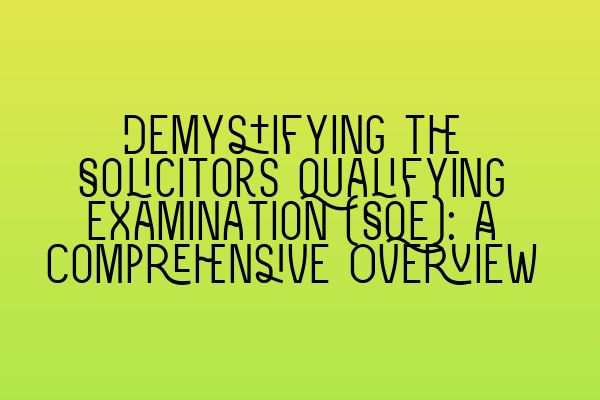Demystifying the Solicitors Qualifying Examination (SQE): A Comprehensive Overview
Welcome to our comprehensive guide on the Solicitors Qualifying Examination (SQE). Whether you are a law graduate or a professional looking to qualify as a solicitor in England and Wales, understanding the requirements and structure of the SQE is essential. In this article, we will walk you through everything you need to know about the SQE and provide valuable insights to help you successfully navigate this important exam.
What is the SQE?
The Solicitors Qualifying Examination (SQE) is a national assessment that determines whether an individual has the necessary knowledge and skills to qualify as a solicitor. It replaces the previous routes to qualification, including the Legal Practice Course (LPC) and the Qualified Lawyers Transfer Scheme (QLTS).
The SQE is divided into two stages: SQE1 and SQE2. SQE1 tests candidates on their knowledge of substantive and procedural law, while SQE2 assesses their practical legal skills.
SQE1: Substantive and Procedural Law
SQE1 is an objective multiple-choice examination consisting of two parts, focusing on substantive and procedural law respectively. The exam assesses candidates’ understanding of the core legal subjects, including contract law, criminal law, constitutional and administrative law, and more.
To prepare for SQE1, it is essential to have a solid grasp of the key legal principles and be able to apply them to various scenarios. Practice questions and mock exams can significantly enhance your knowledge and exam technique, increasing your chances of success.
If you need guidance on any of the core legal subjects, be sure to check out our related article on ‘Joint Ownership: Legal Considerations for Co-Owners of Property’. It provides insights into the legal intricacies of joint ownership, which is a crucial topic within property law.
SQE2: Practical Legal Skills
SQE2 is a practical assessment that evaluates candidates’ application of legal skills in simulated scenarios. It tests their ability to perform tasks such as legal research, interviewing clients, drafting legal documents, and advocacy.
Successfully completing SQE2 requires both knowledge of the law and the practical skills necessary to excel in a legal career. Role-playing exercises, simulations, and practice assessments can help prepare you for the challenges you may face in the exam.
For those interested in property law and its practical implications, we recommend reading our article on ‘Commercial Leases: Essential Insights for Business Premises’. This article provides valuable information on the legal considerations involved in commercial leases and can enhance your understanding of property law in a practical context.
Preparing for the SQE
Proper preparation is key to performing well in the SQE. Taking a structured approach to studying and revising can help you cover all the necessary topics and build confidence in your knowledge and skills.
Here are some effective study strategies:
- Create a study plan: Break down the syllabus into manageable topics and allocate specific time slots for each one. This will ensure that you cover all areas of the exam and have a structured approach to your preparation.
- Utilize study materials: Invest in high-quality study materials that cover the required legal knowledge and skills. These can include textbooks, online courses, video lectures, and practice resources.
- Practice regularly: Actively engage with the exam content by practicing questions, participating in mock exams, and seeking feedback on your performance. This will help you identify areas of weakness and focus your efforts where they are needed most.
- Stay organized: Keep track of your progress, revise regularly, and maintain a revision schedule. This will help you retain information effectively and prevent last-minute cramming.
In addition to your SQE preparation, it is crucial to stay informed about current legal developments and understand their implications. Our article on ‘Tenant Rights in the UK: Understanding Your Legal Protections’ sheds light on the legal protections afforded to tenants and can broaden your knowledge of tenant rights within the context of housing law.
The Importance of SEO Expertise
As a solicitor, it is essential to have a strong online presence to attract clients and showcase your expertise. Search Engine Optimization (SEO) plays a crucial role in increasing the visibility of your website and driving organic traffic.
If you are interested in learning more about SEO for solicitors or property practitioners, our article on ‘Property Transactions and the Legal Process: A Comprehensive Guide’ provides valuable insights into the legal aspects of property transactions and highlights the importance of SEO in the digital age.
Conclusion
The Solicitors Qualifying Examination (SQE) is a significant milestone on the path to becoming a solicitor in England and Wales. By demystifying the SQE and understanding its structure and requirements, you can prepare effectively and increase your chances of success.
Remember to utilize practice materials, engage in active learning, and seek additional resources to supplement your preparation. Stay up to date with legal developments and consider the value of SEO in promoting your legal services.
For further insights into mortgages and land law, we recommend reading our article on ‘Mortgages and Land Law: Essential Knowledge for Property Practitioners’. It delves into the legal intricacies of mortgages and land law, providing essential knowledge for those specializing in property law.
Best of luck on your journey to becoming a qualified solicitor!

Leave a Reply